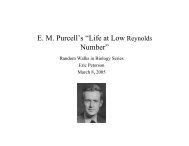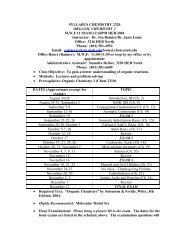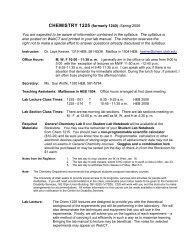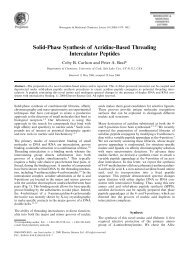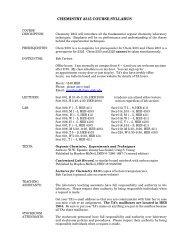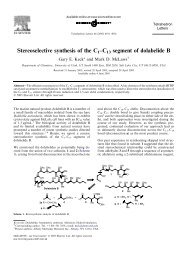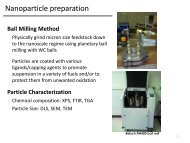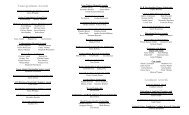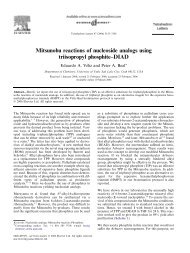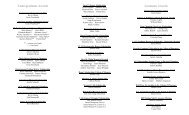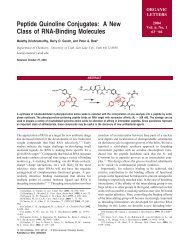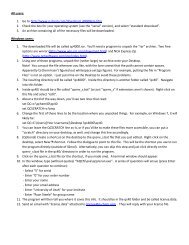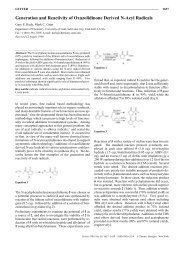ORGANIC CHEMISTRY CHEM 2310 Course Syllabus Fall Semester ...
ORGANIC CHEMISTRY CHEM 2310 Course Syllabus Fall Semester ...
ORGANIC CHEMISTRY CHEM 2310 Course Syllabus Fall Semester ...
Create successful ePaper yourself
Turn your PDF publications into a flip-book with our unique Google optimized e-Paper software.
<strong>ORGANIC</strong> <strong><strong>CHEM</strong>ISTRY</strong> <strong>CHEM</strong> <strong>2310</strong><strong>Course</strong> <strong>Syllabus</strong><strong>Fall</strong> <strong>Semester</strong>, 2006<strong>Course</strong> website address (course information, handouts, review questions, tests, andanswers): http://www.webct.utah.eduInstructor:Bub CarlsonOffice: HEB 1340Phone: please use e-mailE-mail: mcarlson@chem.utah.eduOffice Hours: I am normally on campus from 8 – 4 and my office hoursare anytime after 9:30. My class schedule is on my door. You can sign upfor an appointment on my door or just stop by.Class Times: MWHF 8:35-9:25 a.m., room HEB 2008Quizzes and hour exams will normally be given alternate Thursdays.For extra time on hour exams, work can begin as early as 7:30 a.m.Wednesday class periods before all tests will be review sessions. Onweeks with tests there will be only two lectures.Thursday class periods on weeks with no scheduled tests will bediscussion sessions. On those weeks there well be three lectures.T 8:35-9:25 a.m., LS 102, extra weekly help session (Bub Carlson)There will also be three additional supplemental instruction sessions perweek by SI instructor at times to be determined after the first weekof class.SI instructor: Mark Dammannmarkdammann2@hotmail.comThe Supplemental Instruction Program, called SI for short, is offered in this course toprovide organized study sessions. These sessions are free and open to all students in thecourse and are led by an undergraduate who has done well in this subject area. Your SIleader will be attending classes, reading the material, and doing any relevant assignmentsto be prepared for the SI sessions. The purpose of SI is to see that each of you has theopportunity to do as well as you would like to in this course. In SI sessions, we willreview, organize, and clarify the material from lectures, teach you ways to developeffective study skills for this course, and help you prepare for exams. Your SI leaderwill schedule 3 meetings per week convenient to the majority of your schedules.Attendance is voluntary, and you may attend as many or as few sessions as you like.
To help us determine the best times to offer SI and to assess your learning goals for SI,please complete the 5-minute online survey in the next couple of days. The onlinesurvey can be accessed at: www.studentvoice.com/utah/si.html It is extremelyimportant for the effectiveness of SI that you complete the survey. Even if you areuncertain whether you will use SI, please complete the survey in case you decide touse SI later in the semester.At the end of the semester, please complete the post-survey also accessed atwww.studentvoice.com/utah/si.html to provide us with feedback on your experiencewith SI. Your comments are valued and important to our ability to provide youwith effective SI sessions that meet your needs. Let us know what worked well andwhat you would change!Prerequisites: It is recommended that no student take Chem <strong>2310</strong> without first takingGeneral Chem 1220; it is recommended no one should take Chem <strong>2310</strong> directlyout of high school.Texts:Optional:Organic Chemistry, eighth edition by Solomons and FryhleStudy Guide and Solutions Manual for Organic Chemistry, eighth editionby Solomons, Fryhle and JohnsonMolecular modelsLecture Topic and Test Schedule:Date Lecture Topic Reading AssignmentAug 23 Introduction; Lewis electron dot structures 1-1324 Formal charges; Resonance 14-1825 Molecular geometry 19-4128 Structural formulas; Functional groups 41-7030 Intermolecular attractions; Physical properties (omit 2.16) 70-7831 Discussion sessionSept 1 Alkane nomenclature (omit 3) 134-1394 No class/Labor Day6 Review session7 Quiz # 1 (chaps 1-3)8 Nomenclature of alcohols & alkyl halides; Cycloalkanes 139-15411 Alkane & cyclohexane conformations 154-17113 Disubstituted cyclohexanes 711-18614 Discussion session15 Stereochemistry; R/S nomenclature 193-208
18 Optical activity; Fischer projections 208-18; 223-420 Review session21 Quiz # 2 (chap 4)22 Compounds with more than 1 chiral center 219-22225 Comparing structures; Stereochemistry in reactions 224-23327 Nucleophilic substitution: the S N 2 reaction 238-25128 Discussion session29 The S N 1 reaction; Carbocations; Solvolysis 251-258Oct 2 S N 2 vs S N 1 reactions; Synthetic applications 258-2714 Elimination reactions; the E2 reaction 271-2749 The E1 reaction: Substitution vs elimination 274-28011 Review session12 Hour Exam I (chaps 1-6.14)13 Alkenes; Nomenclature; Preparation by E2 287-29716 Dehydration; Rearrangements 298-30618 Alkyne preparations 307-31519 Discussion session20 Alkyne reductions 315-32323 Electrophilic addition; Markovnikov’s rule 328-33725 Review session26 Quiz # 3 (chaps 6.15-7.8)27 Preparation of alcohols from alkenes 337-34930 Addition of halogens; Halohydrins; Carbene additions 349-359Nov 1 Discussion session2 Hour exam II (chaps 6.15-8.14)3 Alkene oxidations; Additions to alkynes; Synthesis 359-3766 Free radicals; Halogenation of alkanes (omit 9) 447-4718 Predicting product distribution; Radical addition to alkenes 472-4829 Review session10 Chain growth polymers 485-49113 Alcohols; Reactions with HX, PBr 3 and SOCl 2 ; Tosylates 492-51015 Review session16 Quiz # 4 (chaps 8.15-21, 10-A)17 Ethers; Preparations and reactions 510-51620 Epoxides 516-53122 Reductions of carbonyl compounds 537-546
27 Oxidations of alcohols; Organometallics 546-55529 Review Session30 Hour exam III (chaps 8.15-11)Dec 1 Additions of Grignards to carbonyl compounds 555-5684 Synthesis problems involving Grignard reactions6 Review Session7 Unofficial reading day for Chem <strong>2310</strong>, no class scheduled8 Final exam (can work 7-11 am) (chaps 1-9 and 10-12; sect 2.16 and chap9 will be covered second semester) (Note: final not on Dec 14!)Homework assignments Solomons and Fryhle, Organic Chemistry:Answers to these problems will be found in the Study Guide and Solutions Manual.Supplemental homework and review questions will also be handed out in class and somewill be only posted on the web; answers to these will be posted on the web and placed inthe library.Aug 25 1.1-6, 18, 1929 1.8, 10-15, 20, 22-27, 32-3430 2.5, 6, 17, 20, 21, 23, 28, 35-37Sept 2 4.1, 29 4.3-5, 19 a-k, 20 (omit e, h)12 4.10, 3714 4.12, 13, 31, 32, 39, 4216 5.2-5, 9-1319 5.1523 5.17-22, 24-2726 5.33, 35, 38-4030 6.1, 2, 13Oct 3 6.4, 510 6.6-10, 15-1714 6.21, 2517 7.1, 18, 2, 5, 7, 819 7.9-11, 26, 31, 3321 7.13 b-d, 14, 15, 22, 24
28 8.1, 3, 5, 6, 8, 931 8.13, 14, 16, 17Nov 4 8.18, 20-23, 27-319 10.2, 6, 11, 1410 A.1, 218 11.7-9, 26, 13-1521 11.19, 20, 29-30 (a-h), 35, 4628 12.4, 5, 14Dec 2 12.8-10, 12, 15, 17, 19Important Dates:Last day to drop/delete class: Sept 1Last day to withdraw: Oct 20Point distribution for course:Quizzes – 4 @ 25 100Hour exams – 3 @ 100 300Final exam 200600Examination Policies:There are no make-up quizzes or exams. Under certain justified circumstancesstudents may take tests early or late. All tests will be given on Thursdays andreturned the following Monday in class. Any student taking a test late must do sobefore they are returned in class. Come to HEB 1340 Thursday or Friday orbefore 8:15 Monday morning. Any student who misses a test will receive a 0.Errors unfortunately do occur on grading of tests. Always carefully check yourtest with the key located on the course website or on reserve in the library.Legitimate questions about grading of an exam or quiz should be submittedwithin one week after the exam is handed back. Do not write on the test or itmay not be acceptable for regarding.Anyone caught cheating on an exam or quiz will be referred to the Dean fordisciplinary action and should expect to receive an F in the course.
Final grade distribution by percentage of total points:90-100 A 50-61.9 C85-89.9 A- 45-49.9 C-80-84.9 B+ 40-44.9 D+75-79.9 B 35-39.9 D70-74.9 B- 30-34.9 D-62-69.9 C+ below 30 FDeals: At the end of the semester students can make a “deal” to drop one score--an hourexam, a quiz, or the quiz total—not any more. The purpose of the “deal” is tohelp students who may have had one uncharacteristically low test and to motivatestudents to study harder for the final. Students can select which score is to bedropped as part of the deal and should hand in their deal on a piece of paper onMonday, Dec 5, when the last hour exam is returned, but before 5 p.m. onWednesday, Dec 7, the last day of class. Keep all your old tests because you willneed the scores to make your deal.After the score you select is removed, calculate a percentage of total remainingpoints. If you earn this percent or better on the final exam, that score is dropped.If you fail to earn this percent or better on the final exam then no score isdropped. There is no penalty for failing to achieve the deal. The deal/paperyou hand in should include your grades, the grade dropped, and the target percent.Also include your e-mail address (legible, please) in case there is an error in yourproposed deal.Here is an example of the calculation. Suppose the following are your test scoresand you choose to drop your quiz total:Q1 Q2 Q3 Q4 Q Tot HEI HEII HEIII Total Pts % Entering Final10 20 21 14 60 80 71 84 295/400 73.8% / B-10 20 21 14 x 80 71 84 235/300 78.3% / BThus you must get 78% or better on the final (200 pts) to make your deal.You may further improve your grade with the final if you score higher on yourfinal than your overall percentage is lower than a grade cutoff. For example,suppose the student in the example above gets 81% on the final (a 162, a B+).This gives 235 + 162 = 397 total points, or 397/500 = 79.4%. Since 80% is theB/B+ cutoff, and the final exam percent was more above the cutoff (+1.0%) thanthe total average was below the cutoff (-0.6%), the student will be given thehigher grade, a B+.
Teaching philosophy and study strategy:To do well, students should attend class and take very detailed notes. Youshould rely on your lecture notes rather than the text as your primary studyresource. Lecture notes will be posted on the course website (this may not occurfor several days after the lecture). The topics covered in lectures will follow thesame order as the text. The lectures will focus on the most important aspects ofthe material with more emphasis given to the most important points. Examplesused in lecture will be different from those in the text. You will be responsiblefor everything covered in lecture, but not responsible for material that iscovered in the text but not in lecture. It is not possible to cover all the topics inthe text. On hour exam I over half the general background material in the bookwill not be covered in lecture. To get most out of the lectures, it is recommendedyou read the text before lecture, then reread the text in more detail after the lectureto make sure your understand all concepts. The lectures move quite rapidly, soreading the text before lecture will improve your comprehension. Always goover your lecture notes within a day of the lecture.Be sure to do all the assigned problems, handouts, and review questions.Check your answers carefully. Before you do any problems, first go over theconcept involved and make sure you understand the concept and method forsolving the problem. Always check the answer to each problem before you goon to the next, so that you don’t learn and repeat incorrect methods. Pay attentionto small details, because they may be a clue that you don’t understand someconcepts. The answers to text problems are in the study guide and answers tohandouts will be both in the library (Marriott reserve) and on the web. Althoughtest questions will be different from assigned problems and lecture examples, theywill involve the same concepts. It is not sufficient to look over examples ofsolved problems; you must practice solving problems yourself. Rework anyproblems you did not get correct on the first attempt as part of your review beforetests.It is imperative that you not get behind in the material. General chemistrywas a review of high school chemistry and covered many different topics whichcould be approached in any order. Organic chemistry is all new material andbuilds on itself like a foreign language. If you do not understand the basicconcepts thoroughly it eventually becomes necessary to compensate bymemorizing, and there is too much material covered in the course to learn itthrough memorization. Try to understand concepts rather than memorizingthem; ask yourself “why is this logical?” People who do well in this class arethe ones who commit to spending many hours a week necessary to master thematerial. If you find you cannot make the necessary time commitment to get thegrade you want, you might consider withdrawing from the course and taking itanother semester when you can spend more time on it.
It is recommended you organize the material to facilitate learning. The bestway to be able to predict products from a set of reaction conditions is to makenote cards with reactant (written in a general form) and conditions on one side andexpected product on the other side. The best way to prepare for synthesisproblems is to make up preparation sheets organized by functional groups withthe same general reactions which were on the note cards. A good way to organizemechanisms (written in general form) is to put similar mechanisms on the samesheet (those involving carbocations or in acidic conditions, those involvingcarbanions or in basic conditions, and those involving free radicals).Organic chemistry requires frequent visualization of molecular structures in threedimensions, so it is recommended all students purchase or share aninexpensive set of molecular models.Many students have been successful in studying with a partner or in a group. Youcan compare class notes with a study partner and come up with an improved set oflecture notes, you can discuss homework problems and create additional problemsfor each other.There will be review sessions the day before every test. The review, discussion,and supplementary instruction sessions are an ideal time to clear up any questionsyou have about the lecture material and homework problems. To get the mostout of these sessions you should have tried to work all problems beforehand.If these sessions do not answer your questions I will be happy to meet with youpersonally if you are having difficulty, and my goal is to help the maximumnumber of you finish this course with a good grade. The Department ofChemistry office (HEB 2020) also has a list of students who are willing to workas tutors should you feel you want additional help.There will be supplementary problems handed out periodically as well as reviewquestions before every quiz and exam. Old tests will also be available forpractice. Tests and answers to them will be on reserve in the library and postedon the web.Other important points:You are responsible for all information and announcements made in lecture. Ifyou miss a lecture get the notes and all announcements from the course website orfrom another student.Lectures go fast so be prepared. You can read the text in advance of lectures so itwill be easier to comprehend concepts. Each organic lecture section must coverthe same standard number of chapters each semester, so it is not possible to slowdown the lecture pace.
Fifty minutes will be allotted for quizzes, although they should not take more thantwenty five minutes to complete.Hour exams will be fair, but long. If you want extra time you can begin as earlyas 7:30. It will be necessary to know the material well to be able move quicklyand accurately through all the exam questions in a limited amount of time. If youhave another class at 7:30 you can make special arrangements to work after 9:25.The second part of the semester, after hour exam I, is more difficult. The pacequickens and the complexity of the material increases. From this point on most ofthe material in the book will be covered in lectures. Any student who does notdo well on hour exam I is advised to withdraw from the course and to beginagain another semester. The material on hour exam I is background for all themore difficult concepts which follow, and it is highly unusual for a student to beable to comprehend more complicated material with a weak background. It is farpreferable to have a W on your transcript than a D or an F! Hour exam I will bereturned five days before the deadline for withdrawal.The University of Utah seeks to provide equal access to its programs, services andactivities for people with disabilities. If you will need accommodations in theclass, reasonable prior notice needs to be given to the Center for DisabilityServices, 162 Olpin Union Building, 581-5020 (V/TDD). CDS will work withyou and the instructor to make arrangements for accommodations.All written information in this course can be made available in alternativeformat with prior notification to the Center for Disability Services.



